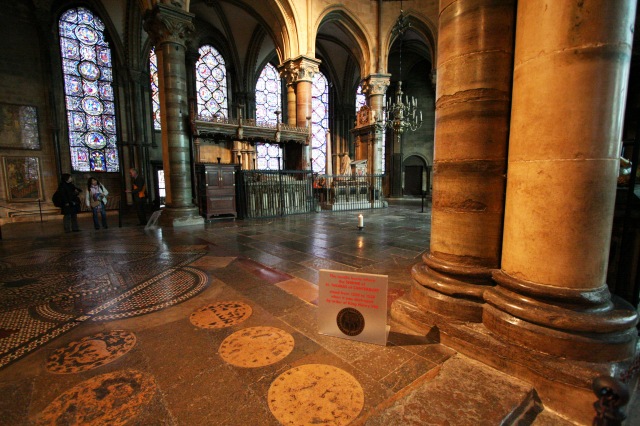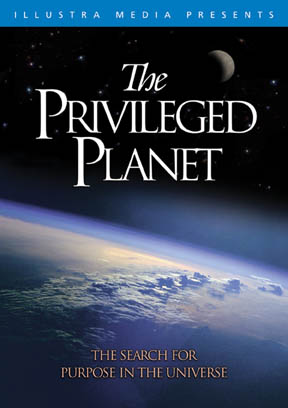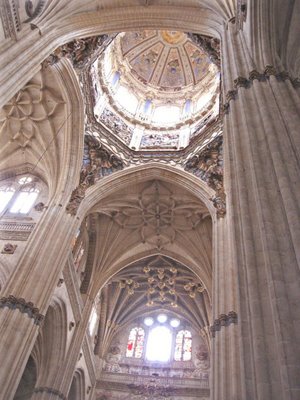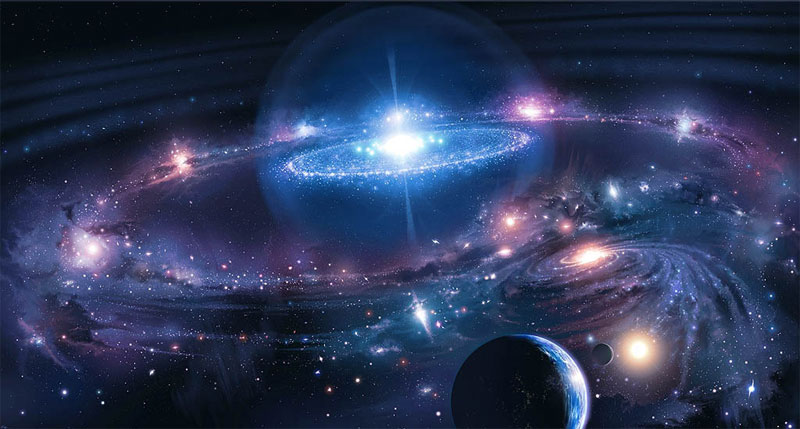Modern Astrophysics and Ancient Cosmology Both Support the Idea that the Heavens Proclaim the Glory of the Church Many people that I have come across say that they believe in God, and might even acknowledge the need to conform to a moral code (quite how they discern it is another matter) but see no reason for ‘organised religion’, which they see as arbitrary creation of mankind. I think that the beauty of the cosmos provides an answer to this question and here’s why.
There is a book (and a film made from book) called the Privileged Planet: How Our Place in the Cosmos is Designed for Discovery. I show the film regularly to my students. It was published in 2004 by the Discovery Institute and was written by Jay Richards and Guillermo Gonzalez, it describes how recent developments in astrophysics impact our sense of the place of the earth in the universe and the chances of life occurring within. It runs through all the conditions necessary for mankind to exist. (For example, we have an atmosphere that both shields us from the harmful part of the solar spectrum and is transparent to the life sustaining part of the same spectrum.) Then it details the chances of all these conditions (and there are dozens) occurring in the same place through the random processes that govern the laws of physics and chemistry in the universe. When all these probabilities are taken into account, the mathematics says that the chance of a place existing that can support us is negligible - so low that it is almost certain that there is no other life in the universe at all. The earth is probably the only planet in existence in the universe that can sustain intelligent life. Furthermore, it is surprising given the probable age of the universe that these conditions occurred even once, here on earth.
Then it goes further. The fact that scientists are able to study such things at all depends on the fact that man is able to observe the universe from here on earth to obtain data about the rest of the universe which he can then analyse and draw conclusions. Surprisingly, it is not a given that he would be able to do this. In order for us to be living within the universe and able to observe the rest of it, another string of specific conditions have to be met (for example a transparent atmosphere through which we can see the stars). It turns out that these conditions coincide with those necessary for the existence of life. That is, the conditions that allow a particular form of intelligent life to exist at all are the same conditions that allow the same form of intelligent life to observe the rest of the universe. The odds of this happening are lower than negligible such that it is even hard to accept that it could ever happen. Yet it has. One conclusion that one could draw from this is that there a forces other than the laws of physics and chemistry in operation here. The case presented doesn't prove God as Creator exists, but it certainly it supports the idea very strongly.
Furthermore it supports the idea that the universe is made for man. Read the following from a sermon by the 5th century Doctor of the Church, St Peter Chrysologus: “Why then, man, are you so worthless in your own eyes and yet so precious to God? Why render yourself such dishonour when you are honoured by him? Why do you ask how you were created and do not seek to know why you were made? Was not this entire visible universe made for your dwelling? It was for you that the light dispelled the overshadowing gloom; for your sake was the night regulated and the day measured, and for you were the heavens embellished with the varying brilliance of the sun, the moon and the stars. The earth was adorned with flowers, groves and fruit; and the constant marvellous variety of lovely living things was created in the air, the fields, and the seas for you, lest sad solitude destroy the joy of God’s new creation. And the Creator still works to devise things that can add to your glory. He has made you in his image that you might in your person make the invisible Creator present on earth; he has made you his legate, so that the vast empire of the world might have the Lord’s representative. Then in his mercy God assumed what he made in you; he wanted now to be truly manifest in man, just as he had wished to be revealed in man as in an image. Now he would be in reality what he had submitted to be in symbol.” (Sermon 148, taken from the Office of Readings on his feast day, July 30th)
This passage leads us more deeply into the question as to man’s place in this universe. If God made the universe for us to observe, then one can assume that he wanted man to go ahead and observe it. But why? This is not discussed in the Privileged Planet (I think it leaves a place for a sequel video and this is my pitch for it!). If God went to such lengths to make man so that he could see and respond to the cosmos then it suggest that there are profound reasons for his doing so. I put the forward the following reasons speculatively:
1. The beauty and order of the cosmos point us to its Creator. We are hardwired to see the divine order that permeates all that is, seen, and through this we gain insights into the order that permeates all that is, unseen. The cosmos bears the thumbprint of the One who made it and when we see its beauty we are moved to love Him and to praise Him.
2. The beauty and order of the cosmos are models that show us how to direct that praise. The rhythms and patterns of the cosmos and the numerical description of its beauty (for example, the movements of the sun, the moon) are those upon which the patterns of our worship are based. The seasons of the liturgical year, the patterns of worship in the each week and each day are based upon this. This is the organizing principle behind ‘organised’ religion, which is so detested by modern man. If we all worship in harmony with the cosmos, then we worship also in harmony with each other. That is why when we go to church there are others there too. They are following the same principle. God gave us this cosmic sign to order our worship. When we worship in harmony with the cosmos, we are in harmony with all the saints and angels in the heavenly liturgy. This is what makes the liturgy the most ‘effective and powerful’ prayer there is (as the Catechism says). Our action of love for God is sychronised perfectly with his gift of himself for us and his grace. This is our route, therefore, to greatest joy in this life.
3. The beauty and order of the cosmos are the models upon which all other human activity, beyond the church, can be ordered. The culture in the broadest sense of the word can be infused with these values. To the degree that man can order time and space he can do so in harmony with the cosmos, and therefore with the liturgy. All that he creates and does can be graceful and beautiful. When the culture reflects the cosmic order in this way, then just as with the cosmos itself, it can raise hearts and minds to God and to praise of Him in the liturgy. Everything stems from and points back to the liturgy. God is still the ultimate author of its beauty, but is now working through man and inspiring each person in his work. Historically, all Christian culture was founded on this principle and it is an important part of what makes the liturgy the basis of culture. It can be illustrated in so many ways and is the basis of my course The Way of Beauty taught at Thomas More College.
The worship of God in the liturgy is the basis of the deepest personal relationship that it is possible to have; it is an earthly but supernatural participation in the heavenly state for which we are made: a perfect and dynamic exchange of love with God the Father, through the Son, in the Spirit, partaking of the divine nature. Therefore, the consideration of man as a human person is founded first on this relationship. Both modern astrophysics and ancient cosmology point to the same idea: that the ‘heavens proclaim the glory of the Lord’ and that it is intrinsic to man’s nature to see this and to respond with praise and worship God. Therefore any anthropology must be founded on the liturgical nature of the human person. It is incomplete if it does not. Similarly all considerations of man and society that rely on anthropology for their basis (such as economics) will also be incomplete if they do not take this into account.
And to come back to the original question posed at the beginning of this article: the beauty of the cosmos is an argument not only for the existence of a Creator but for the liturgy. It sings the song that calls us to church, and to pray the Mass and Liturgy of the Hours. As was said to me recently, the Mass is a jewel in its setting, which is the Liturgy of the Hours; and the Liturgy is a jewel in its setting which is the cosmos. The heavens, therefore point to Heaven, and we participate in the Heavenly dynamic through the liturgy, which is modelled on the heavens…and so the cycle is completed, forever reinforcing and adding to itself. All of this is for man. He is indeed a privileged person.
Postscript:
When I posted this article some readers contacted me to point out that there have been announcements of the discovery of planets that could support intelligent life and that we may not be alone. Does this undermine any of the arguments.? I don't think so because it does not change the statistical argument in any way. The authors of the book upon which the film was based simply presented the statistical arguments for such an event occurring. The chances, while negligible, were not zero. This means that for it to happen once is amazing. For it to happen twice is even more amazing since the chances are even less, but still possible. Furthermore, before we accept that such planets other than our own exist, we should try to find out how certain the information is. If it is merely hypothesis, then it is not yet scientifically proven. And many newspaper articles mistakenly present scientific hypotheses in tones that portray the information as certain.
As Jay Richards one of the authors put it to me: 'We have discovered many hundreds of extra-solar planets, but none that come anywhere near fulfilling the basic conditions for habitability. Often when an extra-solar planet is discovered, though NASA puts out a press release claiming we've discovered an earthlike planet. The most earthlike planet we know of is...Mars.
'That said, nothing in our argument requires that Earth be unique. Our argument simply entails that however many habitable planets there are, they will be extremely earthlike, and they will be better platforms for scientific discovery than the alternatives.'
What about the idea that it points to the existence of a Creator? This is to my mind not undermined either, but represents even more circumstantial evidence; provided that the probablitility of such an event has not been challenged. And to my knowledge it has not.
The fact that there turn out to be more such privileged planets does, one might argue, lessen our privilege in a relative sense (there is another part of the universe that is equally privileged so we are not so privilege relative to the rest of the universe although the reduction is tiny). however, it does not lessen the privilege in an absolute sense (the a priori chances of any one planet in the universe possessing such a privilege, remain unchanged . The material evidence of God's love and generosity that has increased ).
What if at some stage we find such a planet and then can get close enough to find life there? This is an interesting point that is purely hypothetical at this stage. It might be that we would discover that such life had a common salvation history and an immortal soul like man; or could have an immortal soul but unlike man on earth, never experienced a Fall, so have a distinct salvation history; or could be intelligent but possess no immortal soul and so would be a sort of hyper intelligent monkey. All of these life forms would be privileged too.
 This can be something of interest to us and the basis of a powerful lesson for our children.
Recently I wrote an article about the idea that the number five was symbolic of Our Lady, here. In it I raised a doubt in mind about the suggestion that it was part of the tradition. This doubt existed because of the lack of scriptural references or works of the Church Fathers citing it.
This can be something of interest to us and the basis of a powerful lesson for our children.
Recently I wrote an article about the idea that the number five was symbolic of Our Lady, here. In it I raised a doubt in mind about the suggestion that it was part of the tradition. This doubt existed because of the lack of scriptural references or works of the Church Fathers citing it.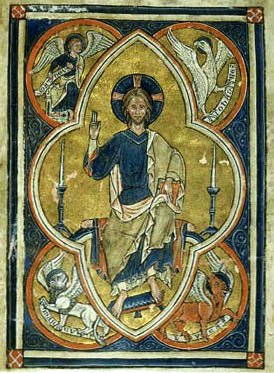 "There are four gospels and only four, neither more nor less: four like the points of the compass, four like the chief directions of the wind. The Church, spread all over the world, has in the gospels four pillars and four winds blowing wherever people live. These four gospels are in actual fact one single Gospel, a fourfold Gospel inspired by the one Spirit, a Gospel which has four aspects representing the work of the Son of God. These aspects are like the four cherubs described by Ezekiel. In the prophet's words: `The first had the like ness of a lion,' symbolizing the masterly and kingly role of Christ in priesthood; `the second had the appearance of an ox,' the beast of sacrifice, recalling the perfect sacrifice of Christ; `the third had the face of a man,' undoubtedly referring to the coming of the Lord in human nature; `and the fourth had the aspect of a flying eagle,' with a clear allusion to the grace of the Spirit hovering over the Church. [cf. Ezek. 1:10; Rev. 4:7] The four Gospels correspond to these symbols. Christ is at the center of them. John actually speaks of his kingly and glorious Sonship to the Father in his opening words: `In the beginning was the Word.' [John 1:1] Luke begins with Zaccharias offering sacrifice. Matthew chooses first of all the Lord's human genealogy. And Mark leads off by calling on the prophetic Spirit which invests humanity from on high."
"There are four gospels and only four, neither more nor less: four like the points of the compass, four like the chief directions of the wind. The Church, spread all over the world, has in the gospels four pillars and four winds blowing wherever people live. These four gospels are in actual fact one single Gospel, a fourfold Gospel inspired by the one Spirit, a Gospel which has four aspects representing the work of the Son of God. These aspects are like the four cherubs described by Ezekiel. In the prophet's words: `The first had the like ness of a lion,' symbolizing the masterly and kingly role of Christ in priesthood; `the second had the appearance of an ox,' the beast of sacrifice, recalling the perfect sacrifice of Christ; `the third had the face of a man,' undoubtedly referring to the coming of the Lord in human nature; `and the fourth had the aspect of a flying eagle,' with a clear allusion to the grace of the Spirit hovering over the Church. [cf. Ezek. 1:10; Rev. 4:7] The four Gospels correspond to these symbols. Christ is at the center of them. John actually speaks of his kingly and glorious Sonship to the Father in his opening words: `In the beginning was the Word.' [John 1:1] Luke begins with Zaccharias offering sacrifice. Matthew chooses first of all the Lord's human genealogy. And Mark leads off by calling on the prophetic Spirit which invests humanity from on high."




